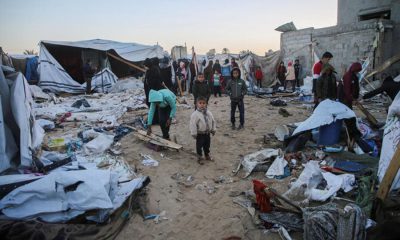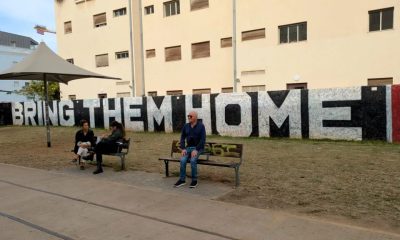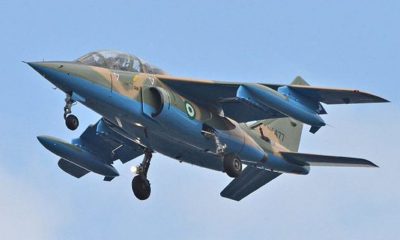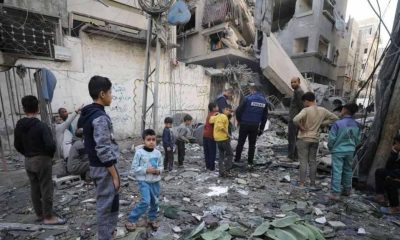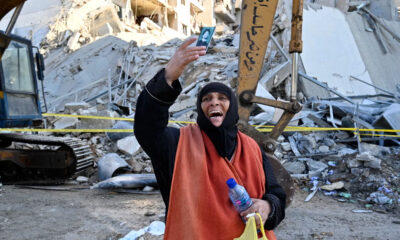International
At least 68 killed in central Gaza in airstrike, adding to weekend’s bloodshed
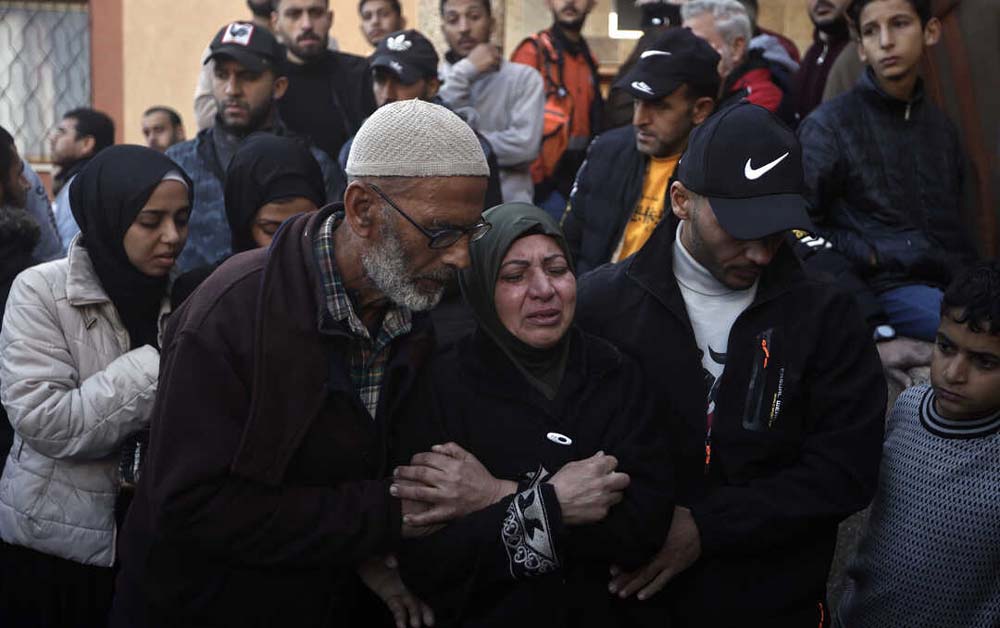
At least 68 killed in central Gaza in airstrike, adding to weekend’s bloodshed
DEIR AL-BALAH, Gaza (AP) — At least 68 people were killed by an Israeli strike in central Gaza, health officials said Sunday, while the number of Israeli soldiers killed in combat over the weekend rose to 17.
Associated Press journalists at a nearby hospital watched frantic Palestinians carry the dead, including a baby, and wounded following the strike on the Maghazi refugee camp east of Deir al-Balah. One bloodied young girl looked stunned while her body was checked for broken bones.
The 68 fatalities include at least 12 women and seven children, according to early hospital figures.
“We were all targeted,” said Ahmad Turkomani, who lost several family members including his daughter and grandson. “There is no safe place in Gaza anyway.”
Earlier, the Health Ministry in Gaza gave the death toll as 70. The Israeli military had no immediate comment.
As Christmas Eve fell, smoke rose over the besieged territory, while in the West Bank Bethlehem was hushed, its holiday celebrations called off. In neighboring Egypt, tentative efforts continued on a deal for another exchange of hostages for Palestinians held by Israel.
The war has devastated parts of Gaza, killed roughly 20,400 Palestinians and displaced almost all of the territory’s 2.3 million people.
READ ALSO:
- ‘New dawn nears’ – President Tinubu sends Christmas message to Nigerians
- Ratcliffe agrees deal to buy 25 percent of Man Utd
- Soyinka visits Tinubu 5 years after advising him to leave politics for young people
The mounting death toll among Israeli troops — 156 since the ground offensive began — could erode public support for the war, which was sparked when Hamas-led militants stormed communities in southern Israel on Oct. 7, killing 1,200 and taking 240 hostage.
Israelis still largely stand behind the country’s stated goals of crushing Hamas’ governing and military capabilities and releasing the remaining 129 captives. That’s despite rising international pressure against Israel’s offensive, and the soaring death toll and unprecedented suffering among Palestinians.
HAMAS EXACTS A PRICE
“The war exacts a very heavy price from us, but we have no choice but to continue fighting,” Israeli Prime Minister Benjamin Netanyahu said.
In a nationally televised speech, Israeli President Isaac Herzog appealed for the country to remain united. “This moment is a test. We will not break nor blink,” he said.
There has been widespread anger against his government, which many criticize for failing to protect civilians on Oct. 7 and promoting policies that allowed Hamas to gain strength over the years. Netanyahu has avoided accepting responsibility for the military and policy failures.
“Over time, the public will find it hard to ignore the heavy price paid, as well as the suspicion that the aims that were loudly heralded are still far from being attained, and that Hamas is showing no signs of capitulating in the near future,” wrote Amos Harel, military affairs commentator for the Haaretz newspaper.
The Israeli military said it had completed the dismantling of Hamas’ underground headquarters in northern Gaza, part of an operation to take down the vast tunnel network and kill off top commanders that Israeli leaders have said could take months.
READ ALSO:
- Nollywood actor ‘shot’ by officer in stable condition – Police
- African bishops reject same-s3x marriage – Catholic priest
- Woman bathes husband with hot water on suspicion of infidelity
Efforts toward negotiations continued. The head of the Palestinian Islamic Jihad, Ziyad al-Nakhalah, arrived in Egypt for talks. The militant group, which also took part in the Oct. 7 attack, said it was prepared to consider releasing hostages only after fighting ends. Hamas’ top leader Ismail Haniyeh traveled to Cairo for talks days earlier.
INSIDE GAZA
Israel’s offensive has been one of the most devastating military campaigns in recent history. More than two-thirds of the 20,000 Palestinians killed have been women and children, according to the Health Ministry in Gaza, which does not differentiate between civilians and combatants.
On Friday, Israeli airstrikes on two homes in Gaza killed 90 Palestinians, including dozens from an extended family, according to rescuers and hospital officials. One of the homes, located in Gaza City, became one of the deadliest airstrikes in the war after 76 people from the al-Mughrabi family were killed, said Mahmoud Bassal, a spokesman for Gaza’s Civil Defense department.
The Palestinian Red Crescent said a 13-year-old boy was shot and killed in an Israeli drone attack while inside al-Amal Hospital in Khan Younis, a part of Gaza where Israel’s military believes Hamas leaders are hiding.
An Israeli strike overnight hit a house in a refugee camp west of the city of Rafah, on Gaza’s border with Egypt. At least two men were killed, according to Associated Press journalists in the hospital where the bodies were taken.
At least two people were killed and six others wounded when a missile stuck a building in the Bureij refugee camp in central Gaza.
And Palestinians reported heavy Israeli bombardment and gunfire in Jabaliya, an area north of Gaza City that Israel had claimed to control. Hamas’ military arm said its fighters shelled Israeli troops in Jabaliya and Jabaliya refugee camp.
Israel faces international criticism for the civilian death toll but it blames Hamas, citing the militants’ use of crowded residential areas and tunnels. Israel has launched thousands of airstrikes since Oct. 7. It says it has killed thousands of Hamas militants, without presenting evidence.
Israel also faces allegations of mistreating Palestinian men and teenage boys detained in homes, shelters, hospitals and elsewhere during the offensive. It has denied abuse allegations and said those without links to militants are quickly released.
READ ALSO:
- Special Investigators report: Emefiele breaks silence, heads to court
- Don’t meddle in crisis you know nothing about, Wike warns Rivers people
- Police arrest tenant who kidnapped neighbour’s children, rescue victims
Speaking to the AP from a hospital bed in Rafah after his release, Khamis al-Burdainy of Gaza City said Israeli forces detained him after tanks and bulldozers partly destroyed his home. He said men were handcuffed and blindfolded.
“We didn’t sleep. We didn’t get food and water,” he said, crying and covering his face.
Another released detainee, Mohammed Salem, from the Gaza City neighborhood of Shijaiyah, said Israeli troops beat them. “We were humiliated,” he said. “A female soldier would come and beat an old man, aged 72 years old.”
INTERNATIONAL PRESSURE
The United Nations Security Council has passed a watered-down resolution calling for the speedy delivery of humanitarian aid for hungry and desperate Palestinians and the release of all the hostages, but not for a cease-fire.
But it was not immediately clear how and when deliveries of food, medical supplies and other aid, far below the daily average of 500 before the war, would accelerate. Trucks enter through two crossings: Rafah, and Kerem Shalom on the border with Israel. Wael Abu Omar, a spokesman for the Palestinian Crossings Authority, said 123 aid trucks entered Gaza on Sunday,
The head of the World Health Organization, Tedros Adhanom Ghebreyesus, reiterated U.N. calls for a humanitarian cease-fire, adding on social media that “the decimation of the Gaza health system is a tragedy.”
Amid concerns about a wider regional conflict, the U.S. Central Command said a patrol ship in the Red Sea on Saturday shot down four drones launched from Houthi-controlled areas in Yemen, a while two Houthi anti-ship ballistic missiles were fired into international shipping lanes.
The Iran-backed Houthis say their attacks are aimed at Israel-linked ships in an effort to stop the Israeli offensive in Gaza.
At least 68 killed in central Gaza in airstrike, adding to weekend’s bloodshed
International
Syria not threat to world, rebel leader al-Sharaa tells BBC
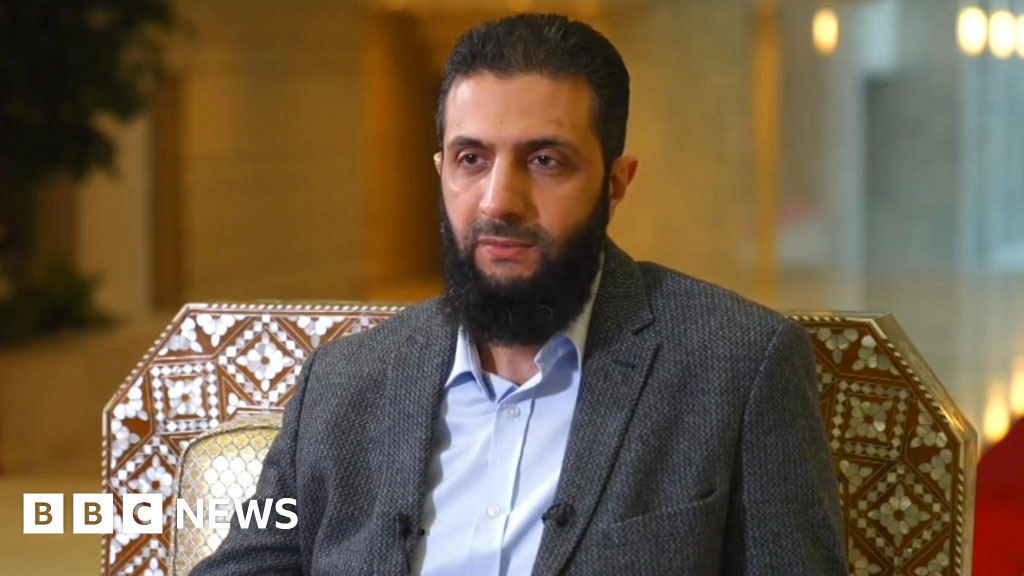
Syria not threat to world, rebel leader al-Sharaa tells BBC
The de facto leader of Syria, Ahmed al-Sharaa, has said the country is exhausted by war and is not a threat to its neighbours or to the West.
In an interview with the BBC in Damascus, he called for sanctions on Syria to be lifted.
“Now, after all that has happened, sanctions must be lifted because they were targeted at the old regime. The victim and the oppressor should not be treated in the same way,” he said.
Sharaa led the lightning offensive that toppled Bashar al-Assad’s regime less than two weeks ago. He is the leader of the Hayat Tahrir al-Sham (HTS), the dominant group in the rebel alliance, and was previously known by his nom de guerre of Abu Mohammed al-Jolani.
He said HTS should be de-listed as a terrorist organisation. It is designated as one by the UN, US, EU and UK, among many others, as it started as a splinter group of al-Qaeda, which it broke away from in 2016.
Sharaa said HTS was not a terrorist group.
They did not target civilians or civilian areas, he said. In fact, they considered themselves to be victim of the crimes of the Assad regime.
He denied that he wanted to turn Syria into a version of Afghanistan.
READ ALSO:
- Tinubu’s 2025 budget will increase poverty, worsen economy – PDP
- Real Madrid outclass Pachuca to win FIFA Intercontinental Cup
- Israel hits ports, energy sites in Yemen after missile intercepted
Sharaa said the countries were very different, with different traditions. Afghanistan was a tribal society. In Syria, he said, there was a different mindset.
He said he believed in education for women.
“We’ve had universities in Idlib for more than eight years,” Sharaa said, referring to Syria’s north-western province that has been held by rebels since 2011.
“I think the percentage of women in universities is more than 60%.”
And when asked whether the consumption of alcohol would be allowed, Sharaa said: “There are many things I just don’t have the right to talk about because they are legal issues.”
He added that there would be a “Syrian committee of legal experts to write a constitution. They will decide. And any ruler or president will have to follow the law”.
Sharaa was relaxed throughout the interview, wearing civilian clothes, and tried to offer reassurance to all those who believe his group has not broken with its extremist past.
Many Syrians do not believe him.
The actions of Syria’s new rulers in the next few months will indicate the kind of country they want Syria to be – and the way they want to rule it.
Syria not threat to world, rebel leader al-Sharaa tells BBC
BBC
International
Israel hits ports, energy sites in Yemen after missile intercepted
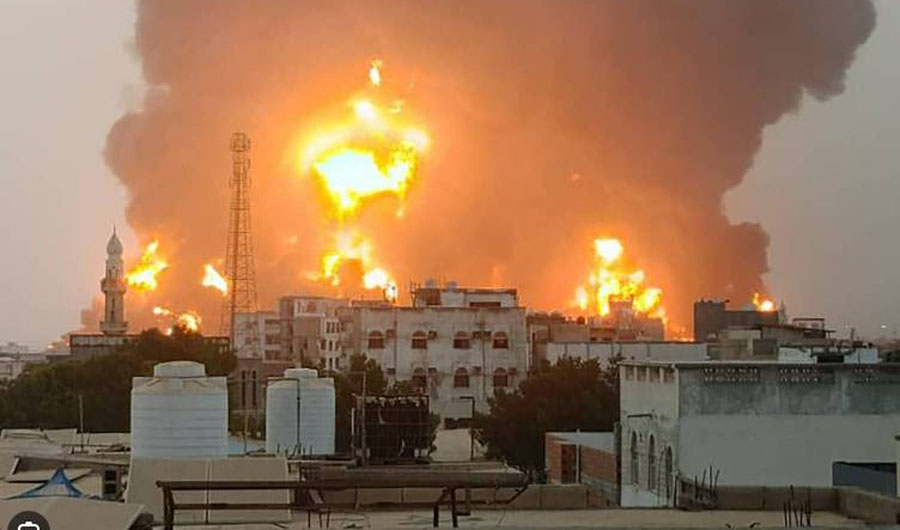
Israel hits ports, energy sites in Yemen after missile intercepted
JERUSALEM: Israel said Thursday it struck ports and energy infrastructure it alleges are used by Houthi militants, after intercepting a missile fired by the group.
Israel’s military said it “conducted precise strikes on Houthi military targets in Yemen — including ports and energy infrastructure in Sanaa, which the Houthis have been using in ways that effectively contributed to their military actions.”
The announcement came shortly after Israel said it had intercepted a missile fired from Yemen.
Al-Masira, a media channel belonging to the Houthis, said a series of “aggressive raids” were launched in the Yemeni capital of Sanaa and the port city of Hodeidah.
It reported raids that “targeted two central power plants” in Yemen’s capital Sanaa, while in Hodeidah it said “the enemy launched four aggressive raids targeting the port… and two raids targeting” an oil facility.
The strikes were the second time this week that Israel’s military has intercepted a missile from Yemen.
On Monday, the Houthis claimed a missile launch they said was aimed at “a military target of the Israeli enemy in the occupied area of Yaffa” — a reference to Israel’s Tel Aviv area.
READ ALSO:
- Gaza mediators intensify ceasefire efforts, Israeli strikes kill 20 people
- PDP expels South-East national vice chairperson over anti-party activities
- Your information on $1bn investment misleading, Dangote Refinery replies NNPCL
Also Monday, an Israeli navy missile boat intercepted a drone in the Mediterranean after it was launched from Yemen, the military said.
The Houthi militants have said they are acting in solidarity with Palestinians and pledged Monday to continue operations “until the aggression on Gaza stops and the siege is lifted.”
On December 9, a drone claimed by Houthis exploded on the top floor of a residential building in the central Israel city of Yavne, causing no casualties.
In July, a Houthi drone attack in Tel Aviv killed an Israeli civilian, prompting retaliatory strikes on the Yemeni port of Hodeidah.
The Houthis have also regularly targeted shipping in the Red Sea and the Gulf of Aden, leading to retaliatory strikes on Houthi targets by United States and sometimes British forces.
Israeli military spokesman Daniel Hagari said the group had become a “global threat,” pointing to Iran’s support for the militants.
“We will continue to act against anyone, anyone in the Middle East, that threatens the state of Israel,” he said.
Israel hits ports, energy sites in Yemen after missile intercepted
International
Gaza mediators intensify ceasefire efforts, Israeli strikes kill 20 people
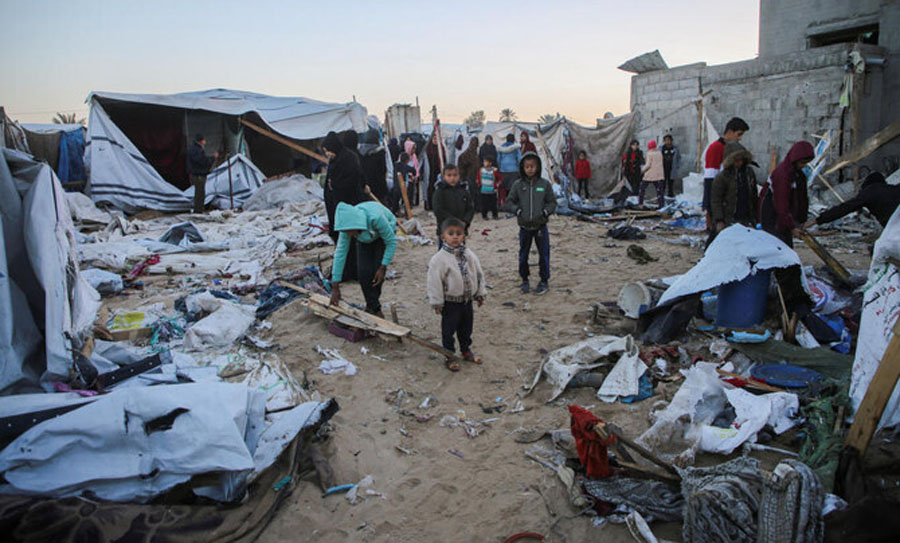
Gaza mediators intensify ceasefire efforts, Israeli strikes kill 20 people
CAIRO: The United States, joined by Arab mediators, sought on Wednesday to conclude an agreement between Israel and Hamas to halt the 14-month-old war in the Gaza Strip where medics said Israeli strikes killed at least 20 Palestinians overnight.
A Palestinian official close to the negotiations said on Wednesday that mediators had narrowed gaps on most of the agreement’s clauses. He said Israel had introduced conditions which Hamas rejected but would not elaborate.
On Tuesday, sources close to the talks in Cairo, the Egyptian capital, said an agreement could be signed in coming days on a ceasefire and a release of hostages held in Gaza in return for Palestinian prisoners held by Israel.
Medics said an Israeli airstrike killed at least 10 people in a house in the northern town of Beit Lahiya while six were killed in separate airstrikes in Gaza City, Nuseirat camp in central areas, and Rafah near the border with Egypt.
In Beit Hanoun in the northern Gaza Strip, medics said four people were killed in an airstrike on a house. There was no immediate comment from the Israeli military spokesman.
Israeli forces have operated in the towns of Beit Hanoun and Beit Lahiya as well as the nearby Jabalia camp since October, in a campaign the military said aimed to prevent Hamas militants from regrouping.
Palestinians accuse Israel of carrying out acts of “ethnic cleansing” to depopulate the northern edge of the enclave to create a buffer zone. Israel denies it.
READ ALSO:
- PDP expels South-East national vice chairperson over anti-party activities
- Your information on $1bn investment misleading, Dangote Refinery replies NNPCL
- Many die at Ibadan children’s Christmas party stampede, organisers arrested
Hamas does not disclose its casualties, and the Palestinian health ministry does not distinguish in its daily death toll between combatants and non-combatants.
On Wednesday, the Israeli military said it struck a number of Hamas militants planning an imminent attack against Israeli forces operating in Jabalia.
Later on Wednesday, Muhammad Saleh, director of Al-Awda Hospital in Jabalia, said Israeli shelling in the vicinity damaged the facility, wounding seven medics and one patient inside the hospital.
The Israeli military had no immediate comment.
In the Central Gaza camp of Bureij, Palestinian families began leaving some districts after the army posted new evacuation orders on X and in written and audio messages to mobile phones of some of the population there, citing new firing of rockets by Palestinian militants from the area.
CEASEFIRE GAINS MOMENTUM
The US administration, joined by mediators from Egypt and Qatar, has made intensive efforts in recent days to advance the talks before President Joe Biden leaves office next month.
In Jerusalem, Israeli President Isaac Herzog met Adam Boehler, US President-elect Donald Trump’s designated envoy for hostage affairs. Trump has threatened that “all hell is going to break out” if Hamas does not release its hostages by Jan. 20, the day Trump returns to the White House.
CIA Director William Burns was due in Doha on Wednesday for talks with Qatari Prime Minister Sheikh Mohammed bin Abdulrahman Al-Thani on bridging remaining gaps between Israel and Hamas, other knowledgeable sources said. The CIA declined to comment.
Israeli negotiators were in Doha on Monday looking to bridge gaps between Israel and Hamas on a deal Biden outlined in May.
There have been repeated rounds of talks over the past year, all of which have failed, with Israel insisting on retaining a military presence in Gaza and Hamas refusing to release hostages until the troops pulled out.
The war in Gaza, triggered by a Hamas-led attack on communities in southern Israel that killed some 1,200 people and saw more than 250 abducted as hostages, has sent shockwaves across the Middle East and left Israel isolated internationally.
Israel’s campaign has killed more than 45,000 Palestinians, displaced most of the 2.3 million population and reduced much of the coastal enclave to ruins.
Gaza mediators intensify ceasefire efforts, Israeli strikes kill 20 people
ARAB NEWS
-

 Railway17 hours ago
Railway17 hours agoLagos Rail Mass Transit part of FG free train ride – NRC
-

 metro2 days ago
metro2 days agoCourt stops customs from seizing imported rice in open market
-

 metro3 days ago
metro3 days agoFG transfers electricity market regulatory oversight in Lagos to LASERC
-

 metro2 days ago
metro2 days agoIbadan stampede: Tinubu orders probe as death toll hits 40
-

 metro2 days ago
metro2 days agoAfe Babalola: Court grants Dele Farotimi bail, barred from media interviews
-

 metro17 hours ago
metro17 hours agoNIMC warns against extortion, reaffirms free NIN enrollment
-

 metro1 day ago
metro1 day agoIbadan stampede: Ooni reacts after arrest of ex-wife
-

 News2 days ago
News2 days agoAdebayo Ogunlesi, 2 other Nigerians make Forbes 50 wealthiest Black Americans list 2024

